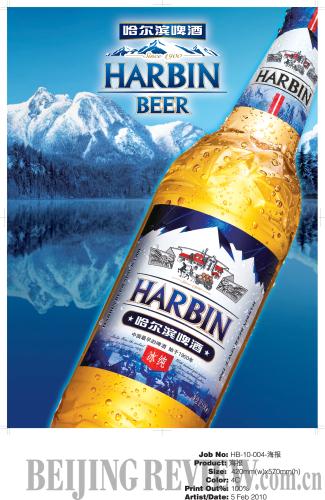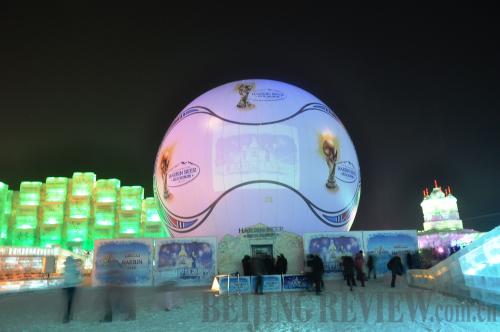|
 |
|
Harbin Beer poster |
 |
|
Harbin Beer |
When the year 2010 arrived, Niu Xiaobo became excited, not simply because a new decade had begun, but because it was World Cup year. The veteran fan loves nothing more than watching football while enjoying a beer, and he describes the four-week tournament as "a honeymoon between himself and football." He celebrated the 2006 Germany World Cup final by treating himself to a dozen beers.
This year, he might just do the same, as China's Harbin Beer has become the tournament's official beer for the first time. "Although the Chinese team did not qualify for the 2010 tournament, our beer brand did it," he said with a sense of satisfaction.
One man who perhaps feels even happier than Niu is Rex Wong, Vice President of Marketing for AB InBev China that owns Harbin Beer.
"We are proud and happy that China's earliest brew, a favorite brand in northeast China, has 'married' the most influential sport tournament in the world. Football fans at this year's World Cup in South Africa are going to experience a special beer buzz thanks to the coming gala event," he said.
When sport meets beer
As China's oldest beer maker, established in 1900, Harbin Beer is famous across the country as a "time-honored brand." However, that reputation could lead people to feel that the hundred-year-old brand needs more modern vigor and passion.
"In some people's opinion, Harbin Beer is their father's beer," Niu said. But the FIFA World Cup may be the right time for Harbin Beer to reverse such an impression.
"Linking up with the World Cup is a golden opportunity for Harbin Beer to rebuild a younger image for people both at home and abroad," said Wong. He told ChinAfrica that after signing the official sponsorship agreement with the 2010 FIFA World Cup Organizing Committee in December of 2009, the company has started a series of marketing campaigns to inject more vigor into its brand. For example, it has doubled efforts in the "Harbin Beer Football Skill Challenge" so as to enhance interaction with its customers.
When football meets beer, it creates passion for people, Wong says, explaining Harbin Beer's theme for sponsoring the South Africa World Cup.
"Furthermore, this is the first time that FIFA has appointed a Chinese brewer to be an official beer sponsor for a World Cup. It shows FIFA's expectation for drawing more enthusiasm from beer to light up greater passion of Chinese fans to the event," he added.
In 2004, U.S. brewer Anheuser-Busch took over Harbin Brewery, China's oldest and then fifth-largest brewer, for about $720 million. Then, in July 2008, Belgium-based InBev purchased the U.S. beer giant for $52 billion, creating the world's largest beer maker, Anheuser-Busch InBev (AB InBev). The company now produces about one quarter of the world's beer.
Total sales volume of Harbin Beer grew 5 percent in 2008, and its summer sales for 2009 surpassed the anticipated target by 10 percent, according to market research firm Euromonitor International.
Alcohol industry analysts from Euromonitor attributed this growth in sales volume to AB InBev's expanded distribution and a wider advertising reach.
"Buoyed by the firm's comprehensive World Cup marketing initiatives and years of cooperation with FIFA, I believe the partnership will significantly raise recognition of the Harbin Beer around the world and in China," said Wong.
Africa move?
But to Wong, becoming the tournament's official beer provider does not mean that Harbin Beer is going to tap into the African beer market immediately. Instead, he sees the move as a driving force to help boost the brand's long-term development.
In recent years, the company has made concerted efforts to rapidly build Harbin Beer's brand in a bid to further expand its market. Wong said Harbin Beer has built a number of steadfast partnerships across the country. For example, the brewer has actively sponsored a series of international events, including the Harbin International Ice and Snow Sculpture Festival.
"We have already doubled our investment to promote the Harbin Beer brand in terms of brewing technology, management know-how, staffing, sales and distribution," Wong told ChinAfrica. "We have also introduced new types of beer under the Harbin brand with new packaging to meet diverse demands."
Riding high on its internal growth and brand building, Harbin Beer is eyeing an annual output of 16 million kiloliters in China this year, despite high raw material prices and fierce competition. The firm will expand Harbin Beer's presence to more provinces such as Hunan, Guangdong, and Zhejiang. The goal is to penetrate 300 different cities by 2010, up from 157 in 2008.
"Our aggressive expansion of distribution for Harbin Beer aims to use the AB InBev sales network to sell [Harbin] beer in markets that are not traditionally strong for us," Wong was quoted by China Business Weekly as saying.
He made clear the firm's ambitions to build Harbin Beer into a well-known national brand in China and then a global choice. In fact, the firm has been selling Harbin Beer outside its home country since 2006, reaching areas such as the United States, Britain, and Southeast Asia. "We now have over 600 dealers selling Harbin Beer across the United States," Wong added.
AB InBev's portfolio in China includes Harbin Beer and Budweiser, another premium brand. Both enjoyed double-digit sales volume growth last year in the Chinese market.
China remains the company's key market because it is the world's largest and fastest growing beer market by volume.
Data from the National Bureau of Statistics shows that China's beer output grew about 7 percent year-on-year to 42.36 million kiloliters in 2009, making the country the world's largest beer producer for the eighth consecutive year.
Meanwhile, beer market data provider Plato Logic estimated that beer consumption in China will reach 35 liters per capita in 2010, up from 17.5 liters in 2000.
Similarly, an industry expert said that Africa is a rapidly developing market with strong potential for beer producers. However, the first important step for Harbin Beer before further overseas expansion is to focus on the Chinese market, according to Wong.
Senior brand strategy expert Xu Yunfeng believes that the World Cup partnership will help pave the way for Harbin Beer to enter the South Africa market, where awareness of Chinese brands is going to be enhanced among African customers.
To enter the Africa market, the expert suggests that Harbin Beer adopt a brand portfolio strategy with the assistance of its parent company. "Harbin Beer should focus on the middle-end and low-end beer market in South Africa," Xu said.
Better Beer, Better World
But before contemplating success in the African market, the most immediate task facing Harbin Beer is its marketing performance for the World Cup.
Harbin Beer has become one of the fastest developing beer brands and has seen remarkable growth in sales. In 2009, sales of Harbin Ice were 60 percent higher than 2008. Now the challenge is to capitalize on exposure from the World Cup and continue that development.
The ongoing campaigns include World Cup-themed commercials, promotion of commemorative beer, and a football skills training camp, all of which are being advertised via television, the Internet and mobile phones. Top priority in these campaigns is the Harbin Beer Football Challenge taking place over four months in 54 Chinese cities. "The event will be the largest for Harbin Beer both by scale and awards," Wong said.
The final prize for the eight winners will be attractive. "In South Africa, they will take part in the International Beer Cup Football Championship on behalf of their home country and one lucky fan will win the chance to take part in the presentation of a Man of the Match award at this year's tournament."
"I'm a firm believer that it will lead to stronger growth [of the brand] and make it more popular among people all over the world," said Wong.
Xu is equally optimistic about the company's strategy, which he describes as clear and focused."However, being an official sponsor [of the World Cup] only amounts to Harbin Beer gaining an entry ticket," he noted. "Whether the company can gain more profits during and after the event will depend on providing an international standard of service and products and strengthening its brand for the long term."
Harbin Beer and World Cup
Created in 1900 in China's Heilongjiang Province, Harbin Beer is one of the earliest brewers in the country and holds a strong foothold in northeast China. From 1950, China operated it as a state-owned entity. In 2004 it was taken over by U.S. brewer Anheuser-Busch for $720 million. Then in 2008, Belgium-based InBev, which entered the Chinese market in 1984, purchased Anheuser-Busch for $52 billion, creating the world's largest beer maker, Anheuser-Busch InBev (AB InBev). Today AB InBev manages 32 breweries across 11 provinces, with more than 36,000 employees throughout China. Harbin Beer now is part of AB InBev, the official beer partner of the 2010 World Cup.
According to AB InBev's sponsorship deal for South Africa World Cup, AB InBev will leverage its portfolio of beers by extending local sponsorship rights to its leading brands in select football markets, including Harbin Beer in China, Brahma in Brazil, Hasseröder in Germany, and Jupiler in Belgium and Netherlands, while globally, Budweiser will serve as the "official beer" of the 2010 World Cup.
Source: www.ab-inbev.com/ www.harbin-beer.cn |